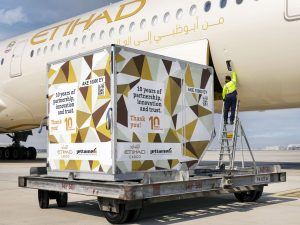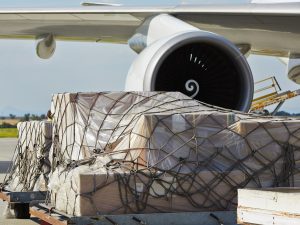C K Govil, CMD, Activair Airfreight says, “The shift towards road transport for cargo like retail, FMCG, pharma, and perishables is driven by the increasing inefficiencies at airport terminals, particularly in storage and capacity constraints for domestic cargo. Road logistics offers flexibility, faster turnaround times, and better connectivity to remote locations, which is critical for time-sensitive goods such as perishables and pharmaceuticals. With airport infrastructure struggling to keep up with the growing demand, especially in domestic sectors, road transport becomes a more reliable option for businesses seeking efficient and cost-effective solutions to ensure timely deliveries across the supply chain.
Read More »Etihad cargo ramps up belly hold capacity with winter schedule
Etihad Cargo has unveiled its expanded winter schedule, increasing belly hold cargo capacity across key global markets. Starting November 2024, the enhanced schedule will introduce additional frequencies to existing routes and a new passenger destination—Nairobi. Etihad Cargo will offer belly capacity on 880 passenger flights per week in November 2024, increasing to over 900 flights per week by March 2025. Etihad Cargo will enhance its operations with additional weekly widebody flights. In Europe, the carrier will add 36 weekly flights, with destinations including Frankfurt, Paris, Rome and Milan moving to double-daily services. Additional flights will also boost capacity in Zurich, Manchester, and Düsseldorf. In Southeast Asia, services to Thailand will increase by nine flights, with Bangkok reaching triple-daily frequency and Phuket increasing to 20 flights weekly. In the US, flights to Boston will increase from four to daily. Etihad Cargo will also upgrade existing services in South Asia and the Indian Ocean. The Malé route, which currently has 14 weekly flights, will switch entirely to widebody aircraft starting from December 15. Additionally, widebody frequencies will increase for Bengaluru from two to three flights per week, and Hyderabad will increase from nine to 11 flights weekly. The capacity will further grow with the introduction of new A320 flights, including a new route to Nairobi, launching on December 15 with four weekly flights. This will strengthen the carrier’s footprint in the Middle East and Africa, supporting increased regional connectivity.
Read More »‘For perishables & pharma, road ensures unbroken cold chain with reefer trucks’
Kamal Jain, Director, Cargomen Logistics says, “Road transport is favored over air cargo for industries like retail, FMCG, pharma, and perishables due to its cost-effectiveness, flexibility, and ease of last-mile delivery. It provides direct access to regional areas and a well-established logistics network that simplifies the distribution process. Additionally, road transport requires less complex booking, allowing for faster scheduling. For perishables and pharmaceuticals, it ensures an unbroken cold chain with refrigerated trucks, maintaining consistent temperature control throughout the journey and minimizing the risk of spoilage or quality degradation, making it a more reliable and efficient choice for domestic logistics.”
Read More »‘Road transport involves no tedious & lengthy paperwork, offers real-time visibility’
Sunil Kohli, Managing Director, Rahat Cargo says, “There is no denying the fact that as compared to other modes, the transportation by road is the cheapest means and agile considering that it does not require a large specific infrastructure and are available of all types which can store & carry assorted nature of cargo including the perishables under specific temperature. Road transport offers greater flexibility to adapt pickup & delivery times facilitating storage for a longer duration. Further, apart from rendering a swift transportation, the recent GPS technologies have made it easy to always track the vehicle’s movement to have real-time information. And above all, no tedious and lengthy paperwork gets involved while transporting the cargo by road which can be delivered at the airport to meet the final timeline of the carrier without having these stored at the airport’s warehouse for long.”
Read More »‘Unorganised domestic carriage, security concerns, high air costs hamper efficiency’
Arun Kumar, President, Association of Multimodal Trasport Operators of India (AMTOI) says, “While I agree that road transport is the preferred mode for certain types of cargo, such as retail, FMCG, pharma, perishables, etc., I believe this is largely due to the remarkable development of road infrastructure in the country. This has significantly reduced transit times and minimized multiple handling, enhancing economic viability. It is a common perception that the lack of storage facilities and capacity at air cargo terminals is the reason for this type of cargo moving by road. However, in my view, this belief is somewhat misplaced. The challenges are more likely due to security concerns and the fact that domestic air carriage remains largely unorganized, which hampers its efficiency. Additionally, the relatively higher cost of air transport compared to other modes contributes to this shift
Read More »‘Road transportation offers flexibility, cost-effectiveness, door-to-door service & improved infra’
Xerrxes Master, Managing Director, Master Group of Companies says, “Road transportation is becoming the preferred mode for cargo transportation in sectors like Retail, FMCG, Pharmaceuticals and perishables. This shift is mainly due to lack of storage facilities at the airports due to limited capacity, high demand and storage challenges whereas in Road Transportation there is flexibility, cost-effectiveness, door-to-door service and improved infrastructure. For example, Pharmaceuticals often require careful handling, controlled temperatures, and fast delivery. Road transportation companies have improved their ability to meet these needs with specialized trucks and temperature-controlled vehicles making roads a preferred option over congested airport terminals. Perishables like fruits, vegetables and dry products need to be transported quickly to avoid spoilage. The lack of sufficient cold storage facilities at many airports makes suppliers rely on refrigerated trucks to ensure faster and more reliable transport. Retail and FMCG sectors rely on quick turnover and replenishment of stocks to meet demand. Road transport allows frequent small-batch deliveries to retail stores which helps in better inventory management. Additionally, road transport offers more control over logistics and schedules compared to air transport which is dependent on flight availability. Thus, emerging trends in logistics such as coal chain logistics, technology-driven solutions and sustainability make road transport a more viable option.”
Read More »FICCI focuses on Grade A sustainable warehousing solutions at 2nd summit
With the focus on developing best-in-class grade A infrastructure at multimodal warehouses across the country and improving connectivity, FICCI organised the National Summit on Warehousing & Supply Chain in New Delhi, themed Driving Efficiency with Innovative Solutions. The full-day event also focused on integrating advanced technologies such as IoT, Block Chain, AI, automation and ML to improve operational efficiency in warehouses. It also touched upon sustainable warehousing solutions and green investments which is relatively a new concept in the Indian market. The event witnessed participation from industry leaders and govt officials.
Read More »Fedex unveils import tool to boost biz processes
IAG Cargo builds up infra for animal handling & transportation
IAG Cargo has strengthened a pre-existing relationship with animal transportation services provider Animal Care such that the latter now serves as the cargo carrier’s export partner for animals at London Heathrow International Airport, in addition to having been its animal import partner since February 2023. According to Animal Aircare, the expansion of the partnership – which actually went into effect in early August – is “testament to its proven expertise in handling the transportation of animals” as well as highlighting both companies’ commitment to ensuring the welfare of animals in transit.
Read More »Challenge Group completes 767 conversion process
Challenge Group has completed its Boeing 767 conversion programme with the deployment of two newly converted 767-300 freighters. It now has – as planned – four B767-300BDSF aircraft in its fleet, the first of which was delivered in autumn last year. Each aircraft has a cargo capacity of approximately 400m3 and is able to carry up to 52 tons. The converted aircraft also include features such as reinforced floors and wide cargo doors for large shipments, while also said to benefit from ‘optimised fuel efficiency’ that make them ideal for operations on both short- and medium-haul routes.
Read More » Cargo Breaking News
Cargo Breaking News









